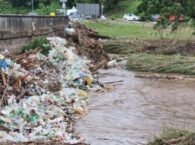
Augustana College
Metrics
University
Augustana CollegeProgram
Sustainable Working Landscapes InitiativeYears
2015-PresentCase Type
Program StoriesSchool Size
0 - 20,000Focus Areas
Economic and Social Inclusion, Environment SustainabilityDiscipline
Business, Communications, Environmental Sciences, Public Administration, Recreational Administration, TransportationRegion
USASustainable Working Landscapes Initiative
Website | www.augustana.edu/academics/core/upper-mississippi-center
The Sustainable Working Land Initiative (SWLI) is the centerpiece of the Upper Mississippi Center’s (UMC) efforts to build learning partnerships that enhance the value of a liberal arts education by solving challenges facing communities. The model is a one- or two-year partnership between Augustana and a city/county partner, matching existing courses and other learning experiences (independent research, internships, etc.) with community-identified and driven sustainability problems.

The SWLI enables cities and counties to achieve their economic, social, and environmental sustainability goals, while allowing students to learn through real-world problem-solving. Modeled after the Sustainable Cities Year Program at the University of Oregon, Augustana’s SWLI is the only such program at an undergraduate institution.
SWLI asks communities to identify their most pressing social, economic, and sustainability challenges. It builds enduring relationships between Augustana and the partner community.
The center’s current partner is Scott County, Iowa, for the second academic year. The project is to assist Scott County in identifying homes with lead-based paint, which can cause serious health issues, particularly among children.
The first year involved 6 courses (geography, GIS, public health, environmental studies, accounting/business, sociology) and 4 senior inquiry research projects (public health, geography); generated experiences for over 100 students; and involved the participation of 8 faculty from a diverse array of departments across campus. Year 2 will involve 5 first year courses (108 students) helping with data collection, 9 additional courses (spanning many different disciplines) comprised of over 161 students doing related projects; and at least 7 senior inquiry research projects.
The UMC mobilizes Augustana’s faculty and students to help communities solve social, economic, and environmental challenges. Communities sometimes lack the resources to develop and implement innovative solutions to sustainability challenges. Augustana students and faculty have the skills and knowledge but often lack real-world settings to put their expertise to work. These sustainability challenges create opportunities for students to learn how to tackle and solve complex, controversial 21st-century problems. The UMC brings these groups together.
The center integrates knowledge and perspectives from the humanities, social sciences and natural sciences to create solutions as students work with community members. Since 2013, the UMC has created high-impact learning experiences across campus with community-based research projects, project-based learning experiences for existing courses, internships, and service-learning experiences.
These experiences:
- Are community-identified and driven problems that focus on an economic, social, or environmental sustainability problems
- Are action-oriented and try to move towards solving the problem
- Require authentic collaboration with community partners and stakeholders
- Create opportunities for students to make a difference
Fun Facts about SWLI
Our work has identified 18% of the pre-1978 housing stock that captures more than 54% of the addresses where children have been poisoned by lead since 2000. It has also identified a locally administered revolving loan fund as the most feasible and promising funding mechanism. Combined, these student-led findings will help focus limited resources in the areas of the county with the highest risk and most vulnerable populations.
Year Program Established | 2015
Country | US
Federal Region of Program |EPA Regions 5 and 7
Public or Private Institution | Private
Number of students at institution | 2,500
Highlight Articles/Videos
Augie students find high level lead risk areas in Davenport and Bettendorf by Yessenia Chavez
Augie students assist in lead-paint fight by Kevin E. Schmidt
City Partners
2015 | City of Clinton Iowa • Population: 22,000
2016 | Scott County Iowa • Population: 450,000+
2017 | Scott County Iowa • Population: 450,000+
Contact Info
Michael Reisner
Organization Director
(309) 794-3418
michaelreisner@augustana.edu
Jenny Arkle
Program Manager
(309) 794-7844
jennyarkle@augustana.edu


